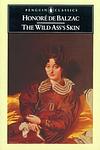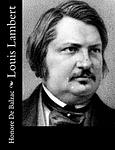Honoré de Balzac
Honoré de Balzac was a French novelist and playwright. He is best known for his magnum opus 'La Comédie Humaine', a series of interconnected novels and stories depicting French society in the period of the Restoration and the July Monarchy (1815–1848). Balzac's work is renowned for its multifaceted characters and detailed representation of society. He is considered one of the founders of realism in European literature.
Books
This list of books are ONLY the books that have been ranked on the lists that are aggregated on this site. This is not a comprehensive list of all books by this author.
-
1. Father Goriot
"Father Goriot" is a classic French novel that explores the themes of wealth, power, love, and social status in 19th century Paris. The narrative follows the lives of three main characters: a young, ambitious law student who seeks to rise above his modest background; an elderly, once-wealthy man who has sacrificed everything for his two ungrateful daughters; and a crafty, ruthless criminal who manipulates others for his own gain. Their stories intertwine in a boarding house, revealing the harsh realities of Parisian society and the destructive power of unchecked ambition and selfishness.
-
2. Cousin Bette
"Cousin Bette" is a novel set in mid-19th century Paris, focusing on the lives of the Hulot family and their cousin, Bette, an old maid who harbors a deep resentment towards her relatives due to their wealth and social status. When Bette learns that her cousin's husband is having an affair, she decides to exact revenge by manipulating various characters and situations, leading to the downfall of the Hulot family. The novel explores themes of jealousy, revenge, and the destructive power of repressed feelings.
-
3. Eugenie Grandet
"Eugenie Grandet" is a classic French novel that explores the life of a wealthy and miserly provincial businessman and his daughter, Eugenie. The father's obsession with wealth and his refusal to spend any of it leads to a life of hardship for Eugenie, who is in love with her penniless cousin. The novel delves into themes of wealth, love, sacrifice, and the complexities of human nature, shedding light on the oppressive social norms of 19th-century French provincial life.
-
4. Lost Illusions
"Lost Illusions" is a sweeping narrative that focuses on the life of a young, ambitious poet from the provinces who moves to Paris in hopes of making a name for himself. Over time, he becomes disillusioned with the corruption and moral decay of the city's literary and high society circles. The protagonist's journey is marked by his struggle to maintain his integrity and idealism in a world dominated by materialism and selfish interests. The novel is a critical commentary on the destructive power of unchecked ambition and the pitfalls of vanity.
-
5. The Human Comedy
"The Human Comedy" is a series of interconnected novels and stories that depict the lives, ambitions, and failures of a wide range of characters in French society during the first half of the 19th century. The series explores the complexities of human nature and society, offering a panorama of French life from the aristocracy to the working class. It presents a detailed and vividly realistic portrayal of the social, political, and economic life of the time.
-
6. The Wild Ass's Skin
The novel revolves around a young, impoverished Parisian named Raphaël de Valentin who stumbles upon a magical piece of donkey skin that grants him the power to fulfill any desire at the cost of shortening his life with each wish. As he grapples with this Faustian bargain, Raphaël is torn between his ambitions and the fear of death, embarking on a journey of indulgence and introspection. The narrative explores themes of fate, materialism, and the human condition, ultimately questioning whether the pursuit of happiness and the fulfillment of desires can truly lead to contentment.
-
7. A Harlot High And Low
The novel delves into the underbelly of Parisian society, following the life of a cunning and ambitious protagonist who navigates the treacherous waters of crime and power. As a sequel to a previous work, it continues to explore themes of social climbing and moral ambiguity, presenting a complex web of characters from different social strata, including a high-class courtesan whose fortunes rise and fall dramatically. The narrative weaves a tale of deception, love, and betrayal, offering a critical look at the corruption and hypocrisy of 19th-century France, while also examining the intricate relationships between money, politics, and social status.
-
8. The Lily Of The Valley
The novel explores the complex emotional landscape of a young man who becomes infatuated with a married woman of higher social standing. Set in the French countryside and Parisian society of the 19th century, the narrative delves into themes of unrequited love, the pursuit of happiness, and the constraints of social class. As the protagonist navigates his passion and yearning for the seemingly unattainable woman, he experiences a profound personal transformation and a deep understanding of the bittersweet nature of human desires and relationships.
-
9. Louis Lambert
The book is a philosophical and semi-autobiographical novel that delves into the life of a precocious and highly intelligent boy who becomes the author's classmate in a provincial boarding school. The boy's profound metaphysical and philosophical musings, influenced by the works of Swedenborg and other mystics, set him apart from his peers and lead him on a quest for transcendental knowledge. As he grows older, his intense intellectual pursuits and his love for a woman named Pauline strain his mental health, ultimately leading to his retreat from society and descent into what is perceived as madness. The novel explores themes of genius, the conflict between materialism and spirituality, and the nature of the human soul.
-
10. Ursule Mirouet
The novel revolves around the life of Ursule Mirouet, a gentle and devout orphan raised by her godfather, Doctor Minoret, in the town of Nemours. As the doctor's wealth and Ursule's prospects of inheritance become apparent, she becomes the target of her jealous and greedy relatives who conspire to discredit her and claim the fortune for themselves. The story delves into themes of greed, family conflict, and the supernatural, as Ursule's life is influenced by mesmerism and visions that guide her through her trials. Ultimately, it is a tale of virtue rewarded and vice punished, set against the backdrop of provincial French society in the 19th century.
-
11. The Girl With The Golden Eyes
The novella delves into the decadent world of Parisian society, exploring themes of lust, power, and the corrupting influence of wealth. It follows a young man of high social standing who becomes infatuated with a mysterious woman with captivating golden eyes. As he pursues her, he uncovers a web of deception and jealousy, revealing the woman's entrapment by a powerful guardian with sinister intentions. The story is a critique of the French aristocracy and the moral decay hidden behind the opulent facades of Paris during the Restoration period.










